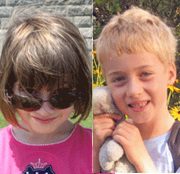Sarah & Joshua
I never expected to have preemies. Yes, I was having twins, I was over 35, and I had placenta previa. But my pregnancy progressed without a hint of trouble.
At 30 weeks and 3 days I started to bleed. I was admitted to the hospital, where my doctor told me I’d be on bedrest in the hospital for about a week, and then finish out my pregnancy, on bedrest, at home. Two days later, I woke up hemorrhaging and all hell broke loose. One emergency c-section later, Sarah Eleanor and Joshua Eugene came into this world almost 10 weeks early.
Four days later I was discharged from the hospital. The doctors had warned me that it would be a tough day, the day you leave without your babies. But I also remember it as a good day, because I was able to hold Sarah for the first time. It was awkward, with all the leads attached to monitors, but I was in heaven. I whispered in her ear, “None of these nice ladies wearing pink is your mommy — I’m your mommy.”
The NICU has been described as a “roller coaster” — one minute you’re up, next minute you’re down — and I found that to be a pretty apt metaphor. We were really lucky in that Sarah and Josh didn’t have any major complications. They were just “growers” — they needed to reach the milestones that would let them go home: regulating their body temperature, going without any Apnea gradually becomes less frequent as premature infants mature and grow. There is no relationship between apnea and sudden infant death syndrome (SIDS). apnea episodes for at least 7 days, and feeding/gaining weight. I remember sitting in the NICU between their two isolettes, eyes glued to the monitors, my heart stopping and starting again based on the numbers. It seems like a long time ago and it seems like yesterday.
Josh continued to have problems with apnea, so the doctors brought in the pediatric gastroenterologist for a consult. After an uncomfortable, 24-hour-long test, Josh was diagnosed with reflux — common among preemies. Medication for the reflux helped resolve the apnea.
 Sarah Eleanor, 7 years old
Sarah Eleanor, 7 years oldDay 29, we got the good news — Sarah and Josh could come home that weekend! At least it was supposed to be good news, but all I could feel was dread. How was I supposed to care for these impossibly tiny babies without a team of doctors and nurses beside me? Then, of course, I felt guilty that I wasn’t happier my babies could come home.
Sarah came home a day before Joshua. We were used to seeing her in a hospital-sized isolette or open crib, so when we placed her in a regular-sized crib she looked so incredibly tiny (all 4 1/2 pounds of her!) that we burst out laughing. That laughter helped ease the tension, and with support from our friends and family we survived those first few months of sleeplessness and worry.
Our insurance company refused to authorize monthly Synagis® shots, which help prevent RSV(respiratory syncytial virus, the #1 cause of re-hospitalization among preemies). Our pediatrician appealed, but we were refused again – no doubt because of the exorbitant cost, around $12,000. Josh did develop RSV at 7 months, but fortunately responded well to the nebulizer and did not have to be hospitalized. So until they were 14 months old, we were under a pretty strict quarantine, especially during the cold/flu season — no playgroups, no Gymboree, no malls, no grocery stores. Luckily the quarantine had one exemption: we could socialize with the other twins who had been in the NICU, since we were all in a similar situation, and we were all very careful about each other’s babies. So Sarah and Josh did get to go to a couple of birthday parties that first year, and even have a few playdates. It helped me feel more like a “normal” mom, and becoming friends with the other “NICU moms” (as we dubbed ourselves) was a lifesaver for me.
 Joshua Eugene, 7 years old
Joshua Eugene, 7 years oldSarah and Josh received services from Birth to Three: physical therapy, speech therapy and occupational therapy. They had developmental delays in just about every area, and those first few years I spent a lot of time going to, as I called them, the “ists” — the pediatric gastroenterologist, the pediatric orthopedist, the pediatric neurologist, and so on. Sarah didn’t walk until she was 21 months old.
But Sarah and Josh are now “normal” — how wonderful that is! — elementary school kids with no lasting effects from their premature birth, and new people who meet them are usually astonished when they learn of their early start. In some respects I feel like the NICU experience has made me a more relaxed parent, since a skinned knee doesn’t seem so earth-shattering compared to an apnea episode. But I am also always mindful that they truly are miracles.


